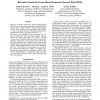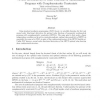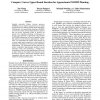143
click to vote
CORR
2012
Springer
13 years 9 months ago
2012
Springer
Abstract— In this paper, we consider a class of continuoustime, continuous-space stochastic optimal control problems. Building upon recent advances in Markov chain approximation ...
143
click to vote
AIPS
2011
14 years 5 months ago
2011
Research in efficient methods for solving infinite-horizon MDPs has so far concentrated primarily on discounted MDPs and the more general stochastic shortest path problems (SSPs...
111
click to vote
MP
2002
15 years 1 months ago
2002
Using standard nonlinear programming (NLP) theory, we establish formulas for first and second order directional derivatives for optimal value functions of parametric mathematical ...
103
click to vote
JGO
2008
15 years 2 months ago
2008
We show that a compact feasible set of a standard semi-infinite optimization problem can be approximated arbitrarily well by a level set of a single smooth function with certain r...
134
click to vote
AAAI
2006
15 years 3 months ago
2006
Partially observable Markov decision processes (POMDPs) are an intuitive and general way to model sequential decision making problems under uncertainty. Unfortunately, even approx...
123
Voted
WSC
2007
15 years 4 months ago
2007
Recently developed dual techniques allow us to evaluate a given sub-optimal dynamic portfolio policy by using the policy to construct an upper bound on the optimal value function....
124
click to vote
FLAIRS
2008
15 years 4 months ago
2008
We address the problem of computing an optimal value function for Markov decision processes. Since finding this function quickly and accurately requires substantial computation ef...
122
click to vote
PRICAI
2000
Springer
15 years 5 months ago
2000
Springer
This paper introduces the even-odd POMDP, an approximation to POMDPs in which the world is assumed to be fully observable every other time step. The even-odd POMDP can be converte...
107
click to vote
ICML
2001
IEEE
16 years 2 months ago
2001
IEEE
This paper examines the notion of symmetry in Markov decision processes (MDPs). We define symmetry for an MDP and show how it can be exploited for more effective learning in singl...
112
Voted
ICML
2005
IEEE
16 years 2 months ago
2005
IEEE
In this paper we consider sampling based fitted value iteration for discounted, large (possibly infinite) state space, finite action Markovian Decision Problems where only a gener...




